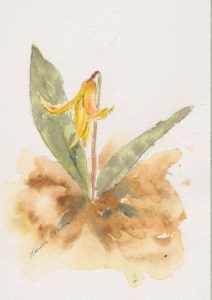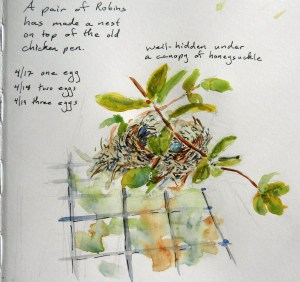He who dwells in the shelter of the Most High
will rest in the shadow of the Almighty.
2 I will say of the Lord, “He is my refuge and my fortress,
my God, in whom I trust.”
3 Surely he will save you
from the fowler’s snare
and from the deadly pestilence.
4 He will cover you with his feathers,
and under his wings you will find refuge;
his faithfulness will be your shield and rampart.
Psalm 91:1-4
As I mentioned last week, I loved hearing this psalm read in Hebrew when I was at a funeral recently. Psalm 91 is one of my favorite psalms and I especially I love the imagery of the first few verses. Seeing a small tree growing in the shadow of a large one or a mother bird sitting on her nest sheltering her young always brings the words of this psalm to mind for me. Here in New York, we tend to welcome sunshine most of the time (except maybe for this week of blazing heat), but the idea of a shadow being a safe place makes a lot of sense when I remember that David, who wrote this, lived in the blazing sunshine of the Middle East, where shade could mean the difference between life and death. This week let’s meditate on these images and also look for reminders of God’s care for us in the natural world.
I was halfway through writing this last week, when I got a call that a deer had leaped onto the driver’s side of the windshield of my parents’ car, when they were going 60mph on a highway (which is why this didn’t get posted last week). Amazingly, despite the shattered windshield and many small pieces of glass in his eyes, my almost 92 year-old father was able to drive 100+ yards till there was a safe place to pull over. There also just happened to be an EMT right behind them, so they got immediate assistance. Both my parents are doing fine now, and this was a big reminder to me of how God doesn’t keep us from hassles and difficulties, but is with us through them.
Of course we are all very thankful for how this experience turned out, but even when things don’t turn out as we would like, God is, in some way, our refuge and fortress, our God in whom we can trust. I haven’t always understood or recognized God’s care at the time, but, looking back, I know he has sheltered me and brought me through to the present.
Monday: From what do you need or want protection? Think about what it means that God is the Most High, greater than anything that could threaten us, and that he offers us shelter.
Tuesday: Throughout Scripture we are urged to dwell in God’s love, care, and presence. Meditate on what it might mean in your life to dwell in God’s shelter.
Wednesday: Are you tired, weary? God invites us to rest. How can you accept that invitation and rest in his refreshing shadow?
Thursday: Meditate on the imagery of a hen watching over and sheltering her chicks- they run to her whenever danger threatens and find safety and comfort under her wings.
Friday: Where do you run when you feel threatened or afraid? Take some time today to think about the things that stress or frighten you, and then imagine how you could find shelter, comfort, and peace in God’s care, even while the danger lurks nearby.
Saturday: Let’s look for images in nature or the world around us that can remind us of God’s care and protection– a Robin covering her young with her wings; a sapling standing in the shadow of larger tree; a woodchuck standing guard at the mouth of her burrow… and please comment if you have images to suggest.

















